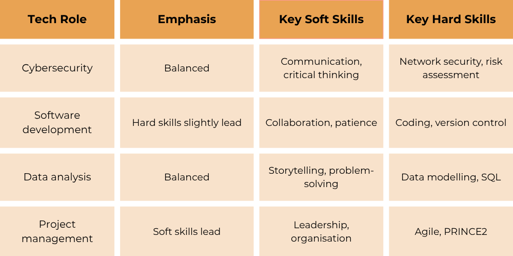What's on this page?
Jump to:
- Hard Skills vs Soft Skills: What's the Difference?
- 15 Examples of Soft Skills
- Why Both Hard and Soft Skills are Essential in Tech
- How Soft Skills Make You More Employable in the Tech Sector
- Which are Harder to Teach - Soft or Hard Skills?
- How to Develop Soft and Hard Skills in Unison
- How to Find the Right Balance for Your Tech Career
- How We Can Help You Develop Soft Skills
Hard Skills and Soft Skills: The Difference and Examples
Hard skills are the technical abilities and specialised knowledge required to perform specific tasks. They’re often measurable and are typically learned through formal education or hands-on experience.
Examples of hard skills in Tech:
- Programming languages (e.g., Python, JavaScript)
- Cyber Security frameworks (e.g., CISSP, CompTIA Security+)
- Project Management methodologies (e.g., Agile)
- Cloud platforms (e.g., AWS, Microsoft Azure)
- Data Analysis tools (e.g., SQL, Power BI, Excel)
These are the skills most commonly listed in job descriptions and required to get your foot in the door.
Soft skills, on the other hand, are interpersonal and behavioural abilities that influence how you work and interact with others. They aren’t tied to specific technical knowledge but are crucial for effective collaboration, communication and leadership.
Our Career Advisor on soft skills...
"I think a lot of people I speak to don't think they have soft skills when, in reality, they are just overlooking them. It's become second nature and therefore, people don't register it as a "skill".
In reality, you are practicing and honing those skills every day in life and in work, it's about knowing how to display them and provide appropriate evidence and context on your CV and in interviews to demonstrate how they benefit your potential employer."
15 Examples of Soft Skills
- Communication: Expressing ideas clearly, listening actively, adapting your message for different audiences.
- Problem-solving: Approaching challenges with creativity, logic, resilience.
- Adaptability: Thriving in changing environments and embracing new tools and processes.
- Emotional intelligence: Recognising and managing your own emotions while responding empathetically to others.
- Teamwork and collaboration: Working harmoniously with colleagues to achieve shared goals.
- Leadership: Inspiring and guiding teams, regardless of job title.
- Time-management: Organising and prioritising tasks effectively to make the best use of available time.
- Creativity: Generating unique ideas and innovative solutions by approaching problems from different angles.
- Empathy: Recognising, understanding, and responding to your own and others' emotions in a considerate and supportive way.
- Active listening: Focusing on and understanding another individual's message fully. This includes picking up on non-verbal cues, asking follow-up questions and providing constructive feedback.
- Conflict management and resolution: Identifying the underlying cause of conflict, and then diplomatically coming to a solution that is the best for all parties.
- Critical thinking: Analysing information objectively to make reasonable and fully-informed decisions.
- Stress management and emotional resilience: Staying calm under pressure and quickly adapting to overcome challenges.
- Attention to detail: Approaching work with care and accuracy to ensure that nothing gets overlooked, no matter how small.
- Initiative: Taking action and solving problems without being prompted.
These are the skills that help you navigate real-world workplace scenarios, especially in fast-paced, innovation-driven industries like Tech.

Why Both Hard and Soft Skills are Essential in Tech
While hard skills might land you a job, it’s often your soft skills that determine your growth and long-term success. In Tech, professionals frequently work in cross-functional teams or lead complex projects. Without strong soft skills, even the most technically skilled individuals can struggle to perform effectively.
Consider these examples and stats:
- A Cyber Security Analyst needs technical skills to identify threats, but must also communicate clearly with non-technical stakeholders during a crisis. In fact, 74% of UK Tech firms prioritise soft skills over hard skills when hiring.
- A Software Developer must know how to code, but also how to collaborate, give feedback and manage time across sprints. Notably in 2025, teamwork was the most frequently listed soft skill in applications for software and coding roles.
- A Project Manager uses frameworks and tools, but also motivates teams and manages expectations. In a poll of 500+ Project Management professionals by the Association for Project Management, soft skills were ranked as the most important factor for ensuring successful project delivery.
Employers increasingly seek candidates who demonstrate both capabilities.
Did you know? The importance of soft skills has grown by 20% since 2018
Analysis by the World Economic Forum (WEF) found that since 2018, the importance of soft skills has grown by 20%.
The WEF's Future of Jobs Report 2025 also found that some of the most in-demand soft skills are analytical and creative thinking, resilience, empathy and leadership.
The hard skills that are on the rise from 2025-2030 are AI, Data, Networks and Cyber Security.
A strong combination of the above would make for a strong application to a role in the tech sector.

How Soft Skills Make You More Employable in the Tech Sector
As automation and AI continue to evolve, the uniquely human attributes provided by soft skills are becoming more valuable.
For learners entering the workforce or reskilling into Tech, mastering soft skills can:
- Improve job interview success
- Enhance leadership potential
- Strengthen workplace relationships
- Boost confidence and presentation skills
Which are Harder to Teach - Soft or Hard Skills?
Hard skills can often be taught through structured courses and certifications. Soft skills, however, require self-awareness, practice, and real-world application. They're developed over time, through experience, reflection, and feedback.
This is why soft skills are sometimes seen as harder to cultivate. But the good news is, they can be developed intentionally.
How to Develop Soft and Hard Skills in Unison
Here’s how you can build both types of skills in tandem:
1. Take courses that combine both
Many Learning People Tech training courses embed soft skills into their curricula. Whether you’re studying Cloud Computing, Coding or Cyber Security, our courses include elements like communication training, problem-solving exercises, and real-world scenarios.
2. Seek feedback and mentorship
Ask for input from peers, instructors, or mentors on how you communicate, lead, and collaborate. Constructive feedback helps refine both technical and interpersonal abilities. While many people wait for their formal performance reviews to receive feedback, those who proactively seek it out will sharpen their hard and soft skills faster, and in a way that's aligned with what their colleagues and teammates need.
3. Practise technical skills in team environments
Apply your hard skills in collaborative projects. Working with others gives you the opportunity to enhance communication, adaptability, and emotional intelligence.
4. Reflect regularly
After completing a project or certification, take time to reflect on how you managed your time, resolved challenges, or communicated with your team. Reflection reinforces learning.
How Soft Skills Helped Jose Land a Job in Web Development
Jose got in contact with us as he was looking to upskill to progress his career in Web Development. After completing our Soft Skills training course, he was able to land an exciting new role.
How to Find the Right Balance for Your Tech Career
The ideal balance between soft and hard skills depends on your career path. Regardless of your specialism, focusing on both sets of skills sets you apart in the job market, makes you a more competitive candidate for Tech roles, and helps you build a resilient, future-ready career:

How We Can Help You Develop Soft Skills
At Learning People, we believe that true career empowerment comes from developing both technical knowledge and human-centric skills. Our Career Pathways are built to equip you with in-demand hard skills and the power skills employers are actively seeking.
All of our courses in IT, Project Management, Cyber Security, Coding and Data, are designed to build not only your technical foundation but your confidence, collaboration and communication too. So, if you're wanting to future-proof your career by developing your soft skills in 2026, we can help.
Soft Skills vs Hard Skills in Tech FAQs
Related Articles
 AI
AIHow to Prepare for AI’s Impact on the UK Job Market and Careers
The "AI is stealing all the jobs" talk is scary. My best advice: don't panic, prepare. In this guide, I've used current statistics to tell a story of how AI is impacting the UK job market and how you can future-proof your career for this digital revolution.
Read More AI
AIHow to Learn AI to Future-Proof Your Career
There’s a lot of noise right now about AI taking jobs. And yes, AI is changing the way work is done in almost every sector. But the smartest response isn’t to panic, it’s to adapt. In this guide, I walk you through how to identify what AI skills you need, and crucially, how to develop them.
Read More Career Advice
Career AdviceChoosing Between Public and Private Sector Careers: A Comprehensive Guide for Tech Professionals
Explore the differences between public and private sector careers, including job security, salary potential, and work-life balance, to make an informed career choice.
Read More Career Advice
Career AdviceNew Year, New Career – How to Best Prepare Yourself for 2026
This is your go-to guide for preparing for a fresh start, understanding your options, and seeing how Learning People can support you every step of the way.
Read More

